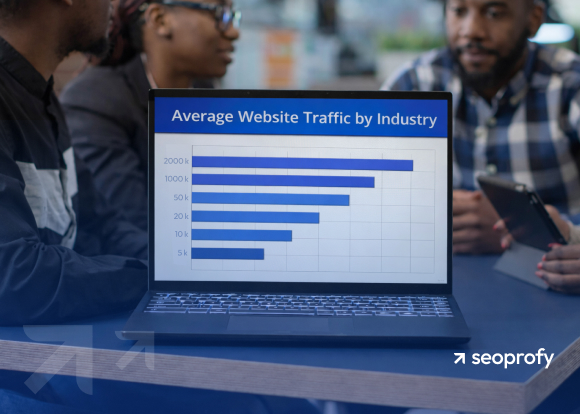You’ve invested in growing your franchise, but some locations are getting top traffic while others barely get noticed? When customers search for local services and see competitors instead of your branches, a clear franchise SEO strategy can shift the balance in your favor.
Franchises deal with issues that independent businesses don’t, from duplicate content to internal competition. This is why SEO for franchise needs a unique approach. We’ll go over the common mistakes holding back your SEO and show you strategies that actually work.
- Strong franchise SEO builds reliable local traffic.
- Google evaluates each location individually.
- Duplicate content and inconsistent NAP data hurt rankings.
- Managing reviews and local backlinks can improve your search visibility.
What is Franchise SEO?
Franchise SEO (search engine optimization) is a set of strategies that help a franchise website rank higher in search and attract customers to its local branches. If a company has multiple locations, a more nuanced SEO strategy is required to achieve good rankings.
The whole point of franchise SEO is to make sure your branch shows up when people make brand/nearest location searches, looks right in Google Business, and is easy to find on the map. That’s why it focuses on local keywords, managing reviews, and keeping business info accurate.
Why is SEO for Franchises Important?
Local franchise SEO has one major advantage: it brings in customers who are already nearby. Some of them might already know your brand and search for something like “Starbucks near me,” while others might just be looking for a service like “dry cleaners Cincinnati.”
Either way, if your franchise SEO strategy is working well, your site will show up in Google’s Local Pack (the top section with the map and local business listings). Users see the location of the physical store, and statistics show that 76% of them visit the location within the day after searching.
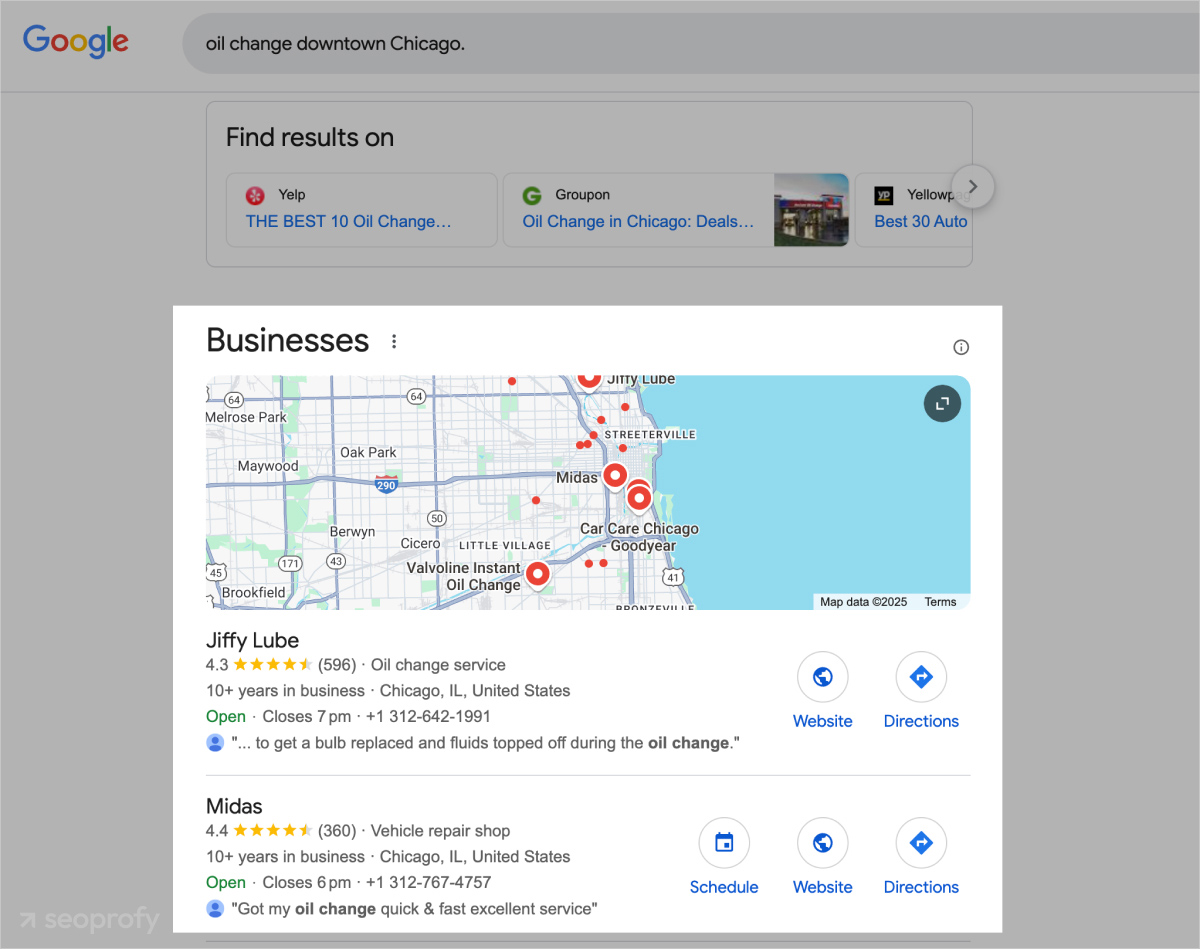
For non-branded searches, this also builds brand awareness among people who’ve never heard of you before. That’s huge for franchises, since they generate new leads.
But SEO for franchise isn’t the only way to get to the top of Google local search results. There’s also the option of paid search ads (PPC). When someone searches, sponsored results appear above organic ones.
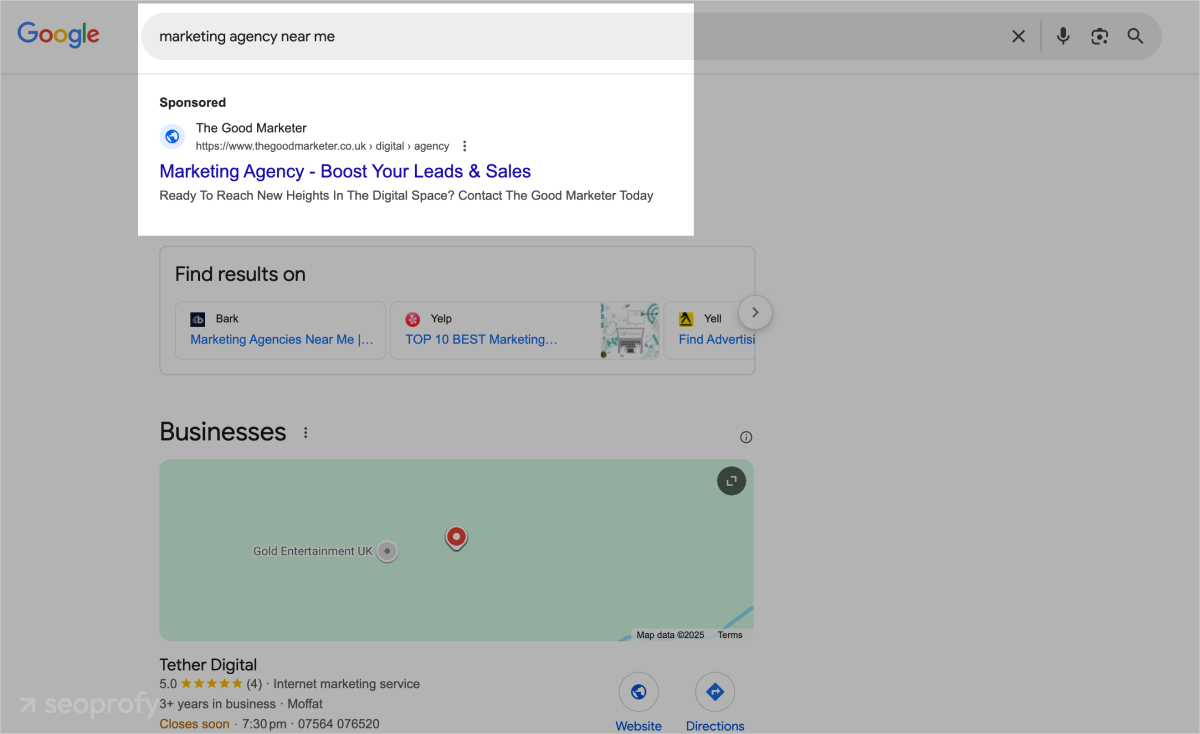
Sponsored pages can also show up in Google’s Local Pack. However, when you invest in ads, you’re not avoiding competition. You’ll still battle for top ad positions against businesses vying for the same keywords.
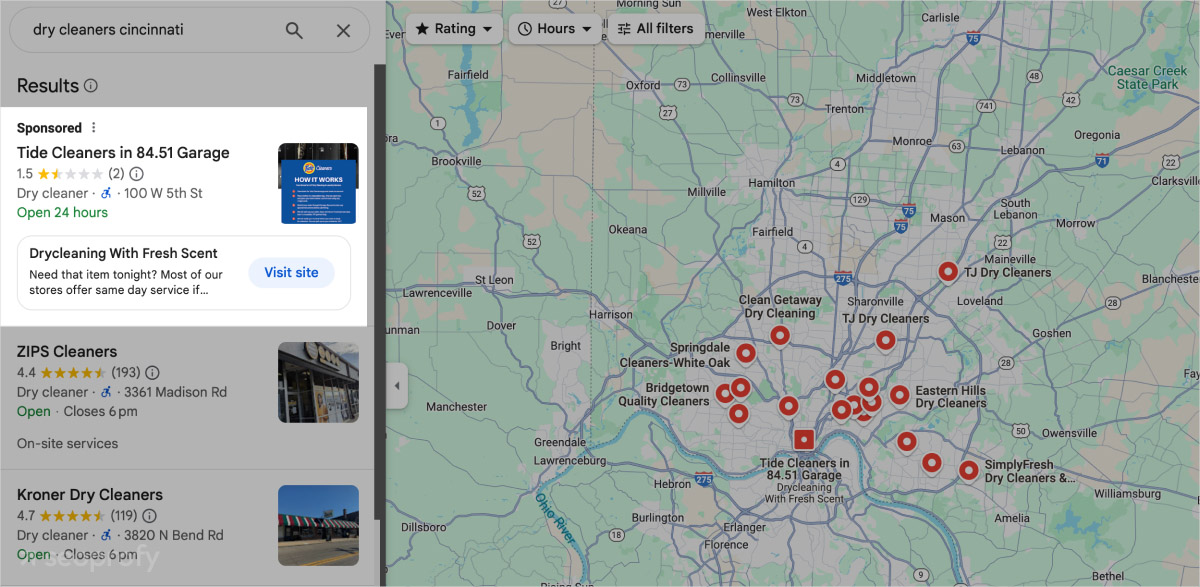
You set a campaign up in your Google Ads dashboard and pay for every click a user makes on your link.
| Organic vs. paid search | ||
|---|---|---|
| Parameter | Franchise SEO | PPC |
| Costs | Requires investment in content, links, optimization | The price of clicks in competitive markets can be high, and CPA (converting visitors into customers) through advertising may not be cost-effective. |
| Speed of results | Takes several months | Shortly after launch |
| Conversion rate | Higher with well-optimized local SEO strategies for franchises | Depends on ad quality and landing page optimization |
| Budget dependency | Can drive organic traffic to franchise websites even without regular investments | Requires a continuous budget (traffic stops when the budget runs out). |
PPC and local search engine optimization are way more effective when you use them together. Paid ads help fill the gap if your organic rankings aren’t strong yet, but if your franchise SEO isn’t solid, you’ll struggle to turn clicks into actual customers. Getting clear on organic vs. paid search differences helps you put your budget where it actually makes a difference.
Local SEO Challenges for Franchises
Promoting a franchise in local search requires a unique approach. A small local business might get decent results with a solid Google Business Profile and a few local backlinks, while franchises must balance scalability and personalization.
That’s what makes local SEO for franchises unique and complex: it blends small business tactics with enterprise SEO trends to create a scalable yet locally relevant strategy. There are some specific roadblocks that franchises may run into, and it’s worth taking a closer look at them.
Manage Local SEO for Multiple Locations
The biggest challenge in franchise SEO is managing multiple independent ecosystems at once. Each branch has its own competition, search trends, and customer behavior, which means rankings can vary greatly.
That’s why major franchises like Starbucks and Burger King customize their franchise SEO strategies by region. In Canada, the focus is on drive-thru convenience, while in Europe, it’s on cozy café culture. This is reflected in localized keywords, structured data, customer reviews, and region-specific content. But pulling it all together is a massive undertaking.
Limited Budget and Resources for Franchisees
Opening a franchise isn’t cheap. A McDonald’s location, for example, costs between $1.47 million and $2.64 million upfront, depending on location and format. Franchisees also pay ongoing royalties to corporate, plus operational costs. And on top of that, you still need to invest in franchise location marketing.
Big chains (McDonald’s, Subway, etc,) pool franchisee contributions into a central marketing fund and handle the franchise SEO. But if digital marketing is decentralized, it becomes the franchisee’s responsibility.
New franchisees may stall here. Limited budgets and no profits yet, so what gets priority? Local backlinks? More reviews? Meanwhile, bigger competitors with deeper pockets dominate the rankings.
Treat local SEO marketing for franchises as a non-negotiable expense. Plan your budget before opening.
Handle Reviews Across Locations
Reviews can affect your local search rankings. The more a location gets, the better its chances of ranking in the Local Pack. This factor, along with several others influencing rankings, is widely recognized by marketers:
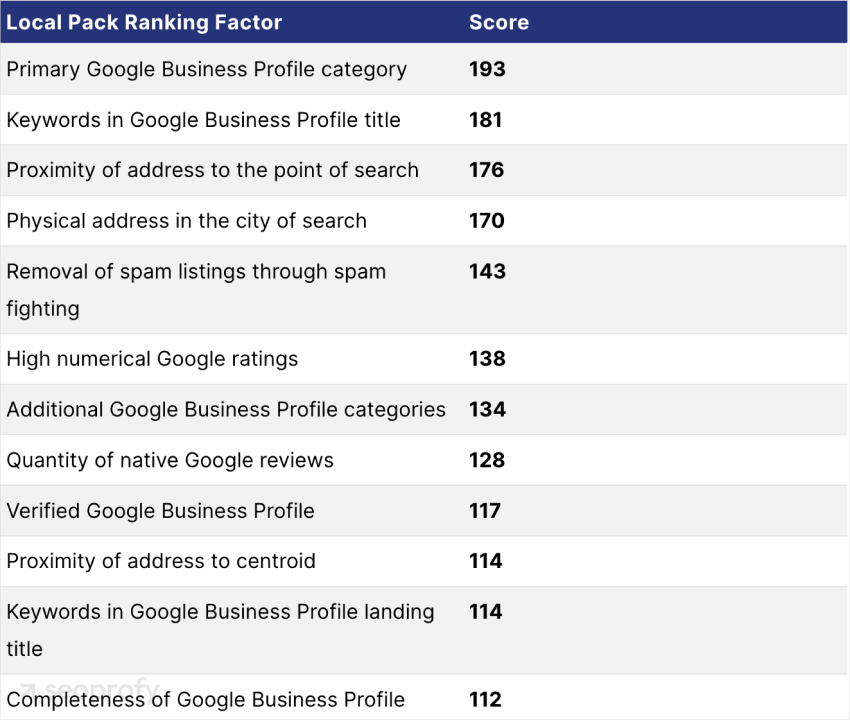
But for franchises, reviews can be a management nightmare. Each location collects its own ratings, and search engines treat them as separate local signals. One location might engage with customers and maintain a 4-star rating. Another ignores complaints and slips to 2 stars. As a result, a single brand can show up in Google Business Profile with ratings ranging from 4 to 2 stars. This reputation gap doesn’t just look bad. It hurts rankings.
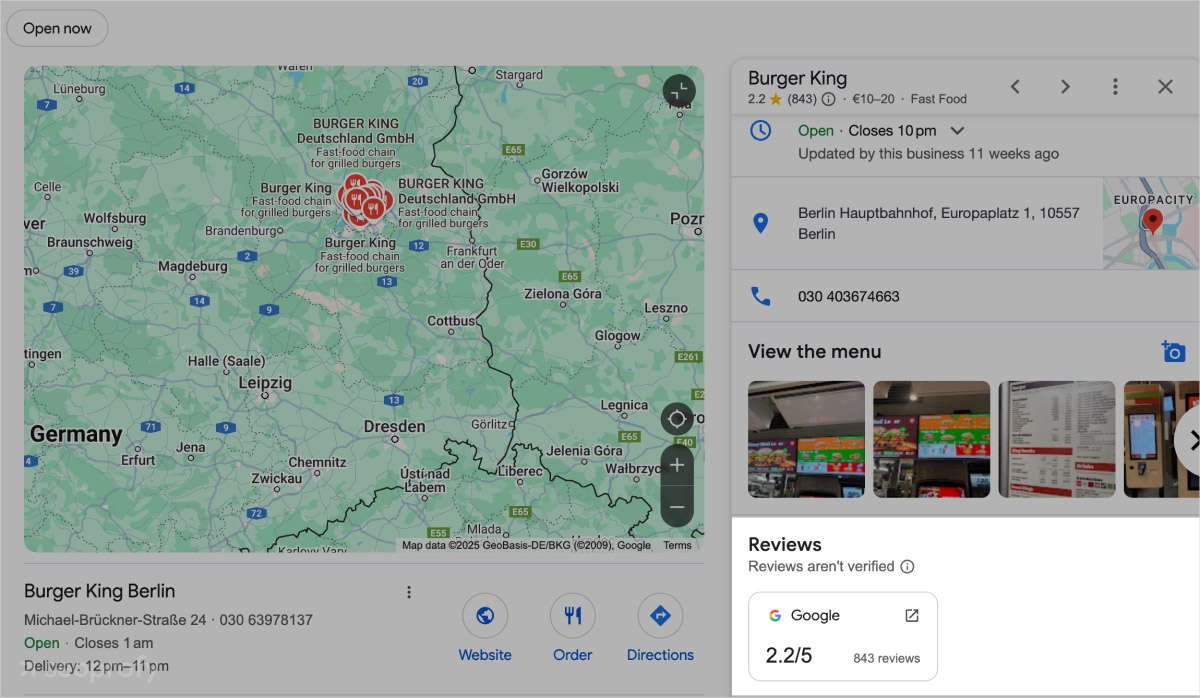
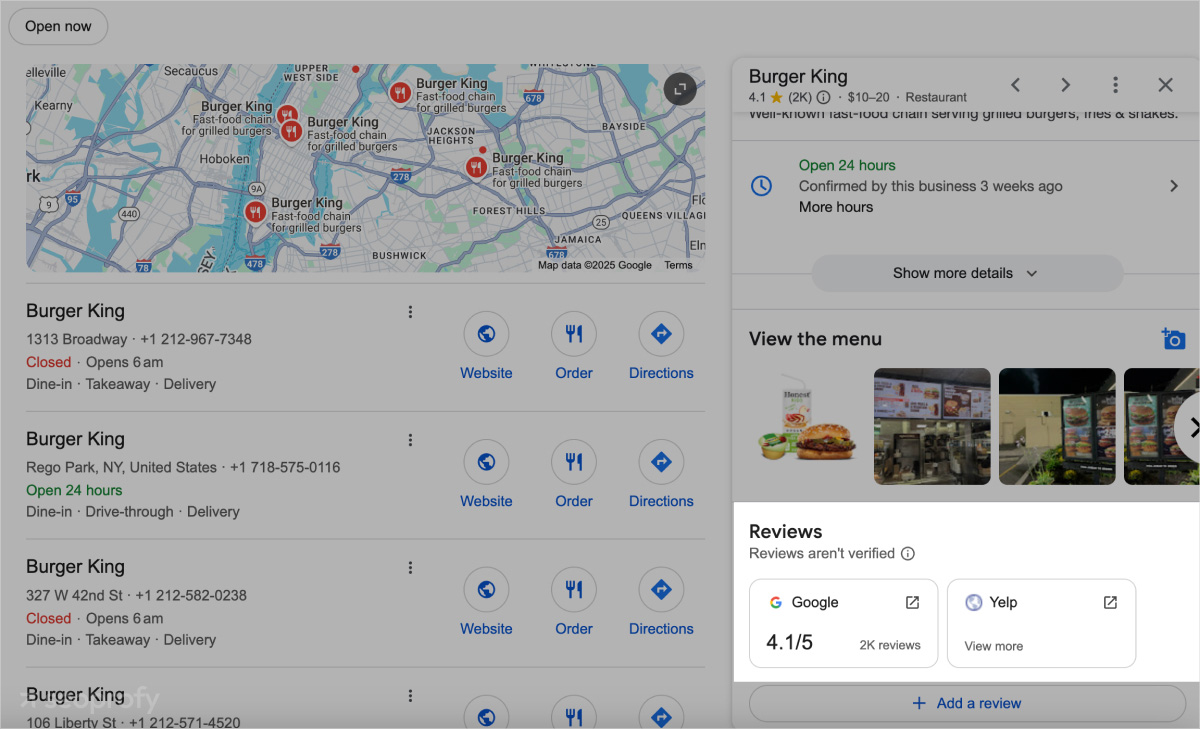
And that’s just the start. Franchises also deal with fake reviews from competitors and customers accidentally leaving feedback for the wrong location.
How to Build a Winning Franchise Local SEO Strategy
Local search is a battle for franchise websites. Every location needs its own proof of relevance. A clear local SEO strategy can marry local optimization with brand unity. Let’s take a look at how to build one.
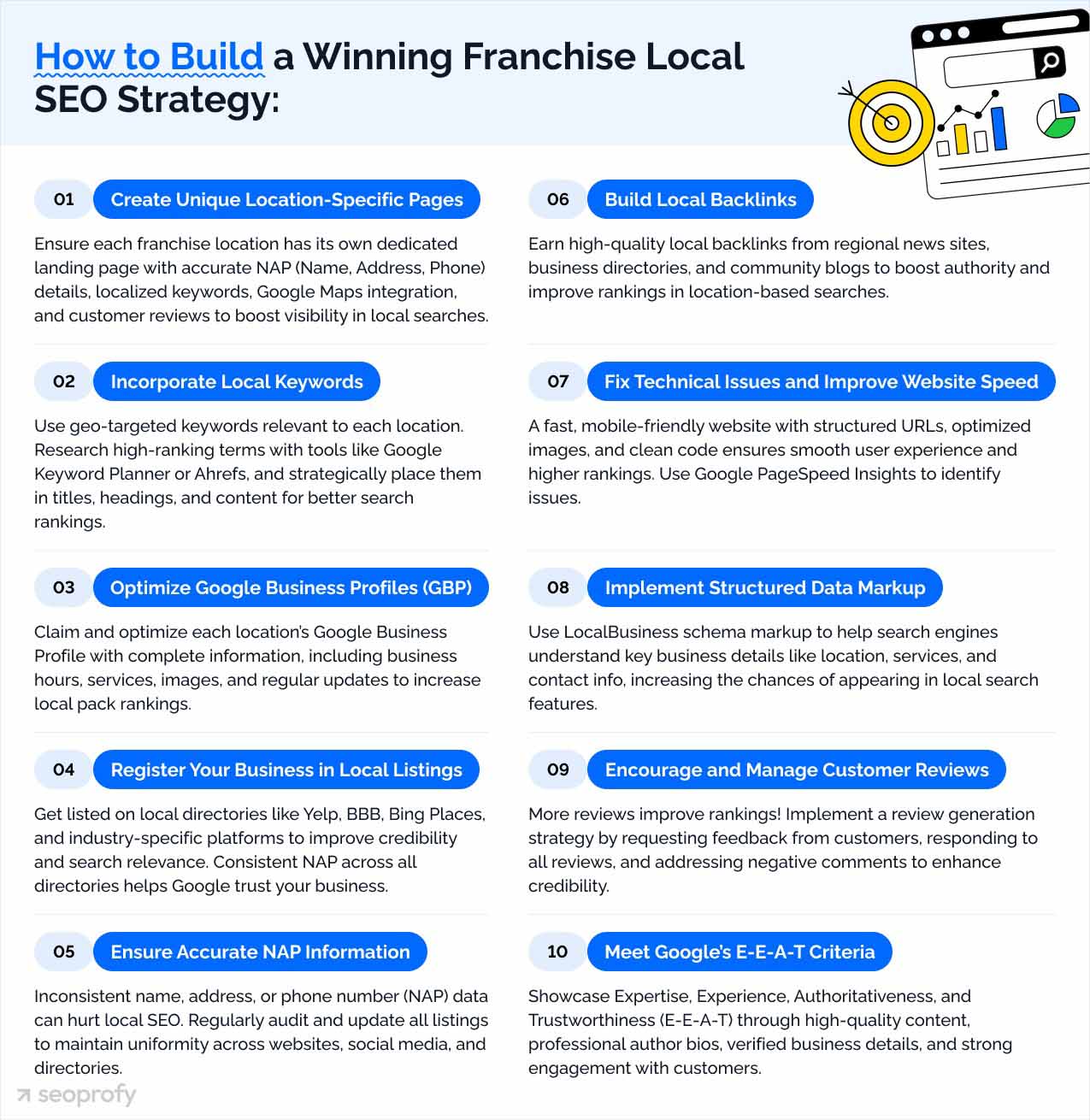
Create Unique Location-Specific Pages
SEO for franchise demands specificity. Since search engines treat each location as a separate business, without a unique localized landing page, it won’t appear in the Local Pack, gather reviews, or drive traffic.
Big brands like McDonald’s create separate country-specific domains to better target local audiences and meet regulations. But within a single country, focusing on location pages is the way to go.
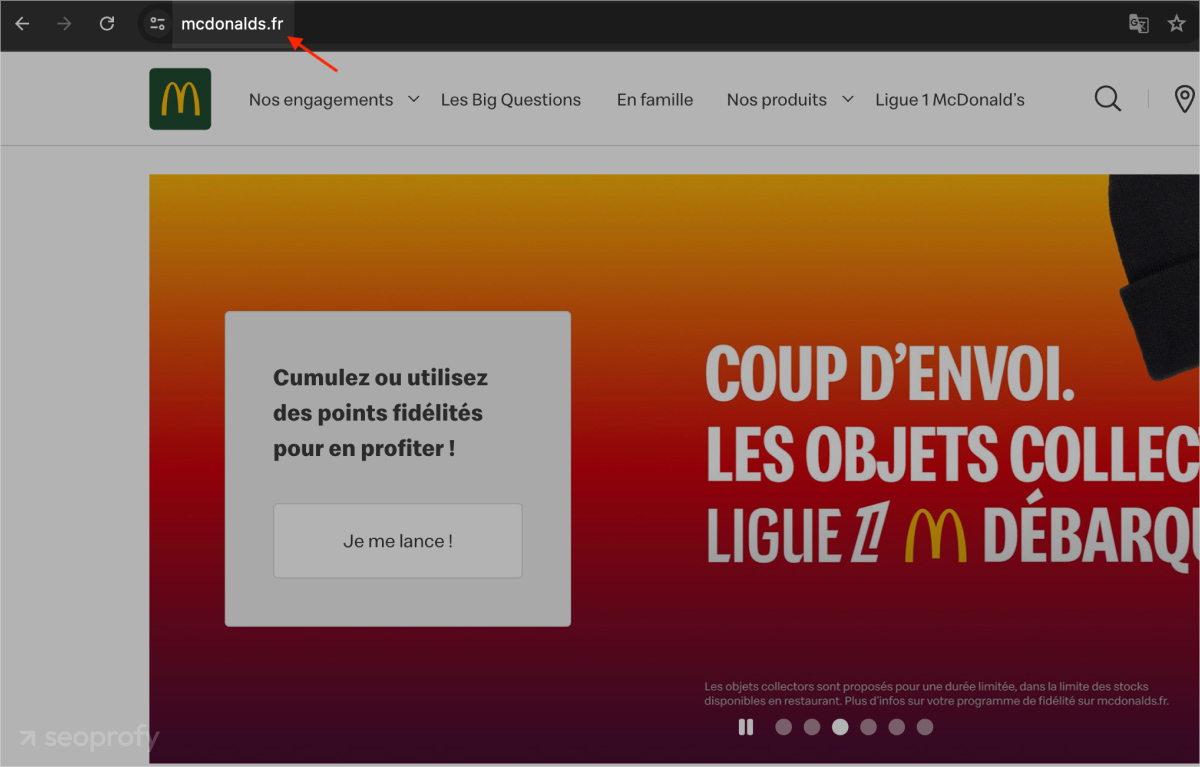
Each location should have its own URL (e.g., /locations/new-york), NAP (Name, Address, Phone Number) data in structured markup (company name, address, phone, formatted for search engine), local keywords, reviews, CTAs (such as “Reserve a Table”), and a map.
Starbucks is an example of a successful SEO for franchise — each location has its own page with address, hours, contact details, map, and a few CTAs:
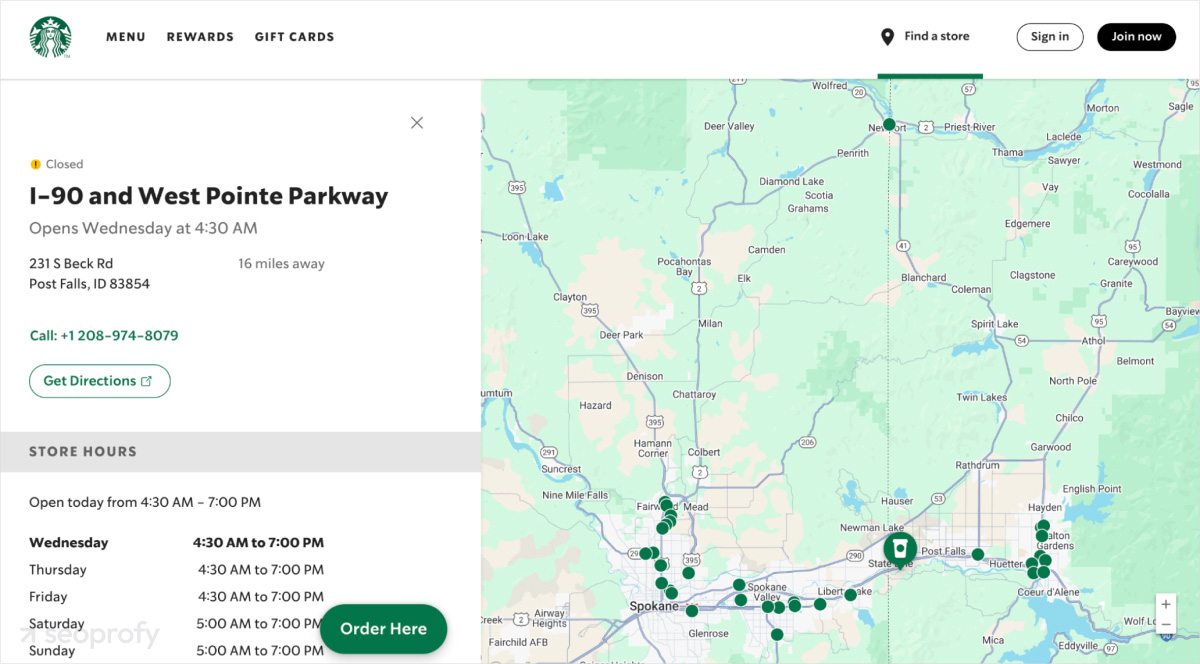
Incorporate Local Keywords
Without solid keyword research, local franchise SEO can’t build organic growth. Keywords are the phrases people type into search when looking for services or products. Search engines aim to show the most relevant results, so if a business isn’t using the terms customers are searching for, it simply won’t show up.
To find relevant keywords, start by checking Google’s autocomplete. Type in your main query (like “oil change”) and see which geo-specific terms Google suggests:
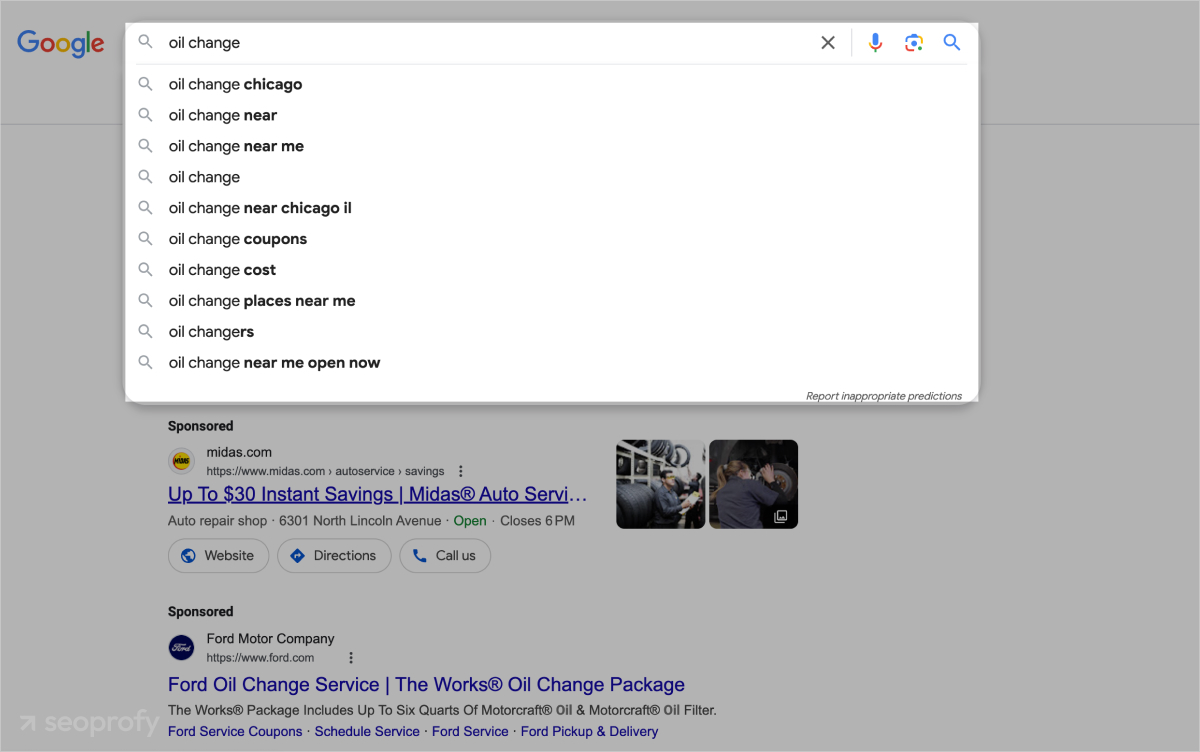
At the bottom of the page, Google also shows other queries people are searching for: ready-made data for expanding your keyword list.
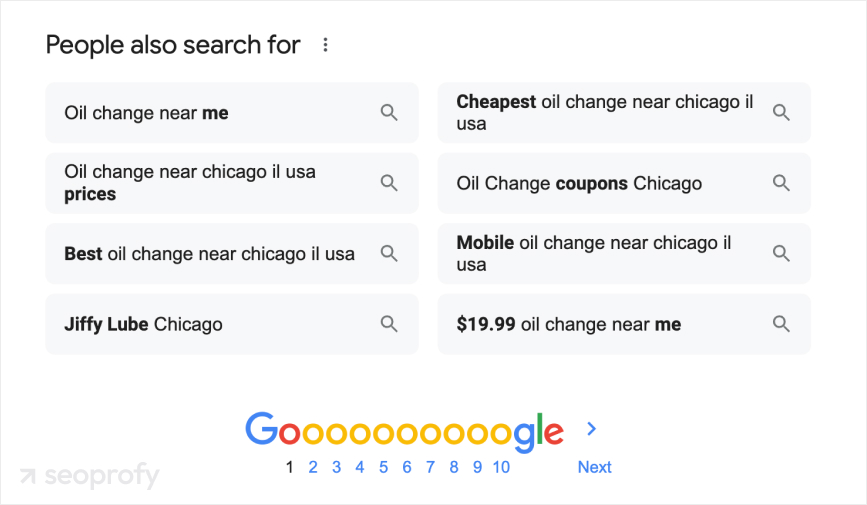
Once you have your core keywords, run them through Ahrefs. You’ll discover popular and, most importantly, achievable target keywords that can bring in local traffic.
Broad keywords are tempting because they have high potential, but they also come with a high Keyword Difficulty (KD). So, they’re usually harder to rank for.
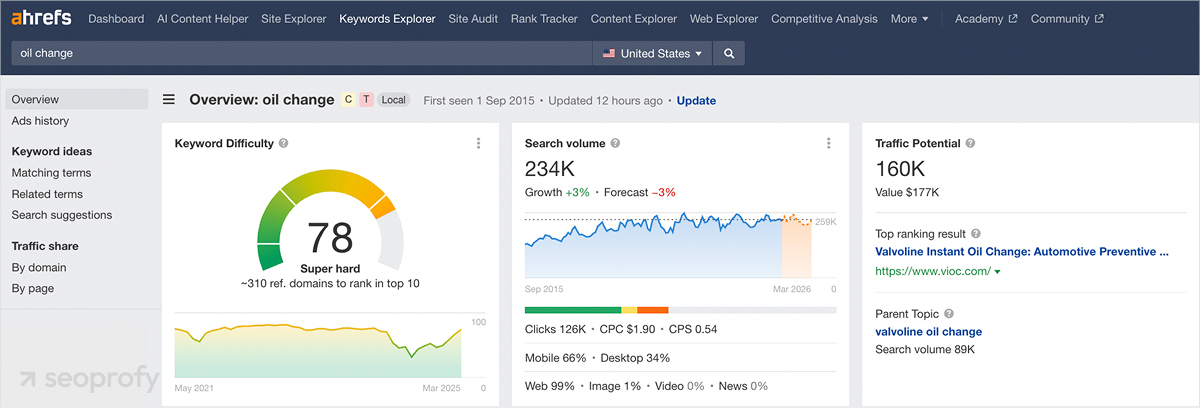
Google Keyword Planner is also useful for checking search volume at a more granular local level.
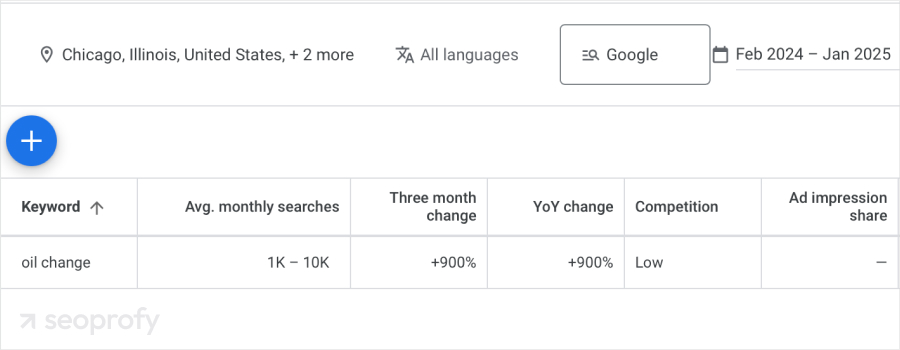
Use the “Matching terms” tool in Ahrefs’ Keywords Explorer to find keyword variations that have local demand but lower KD.
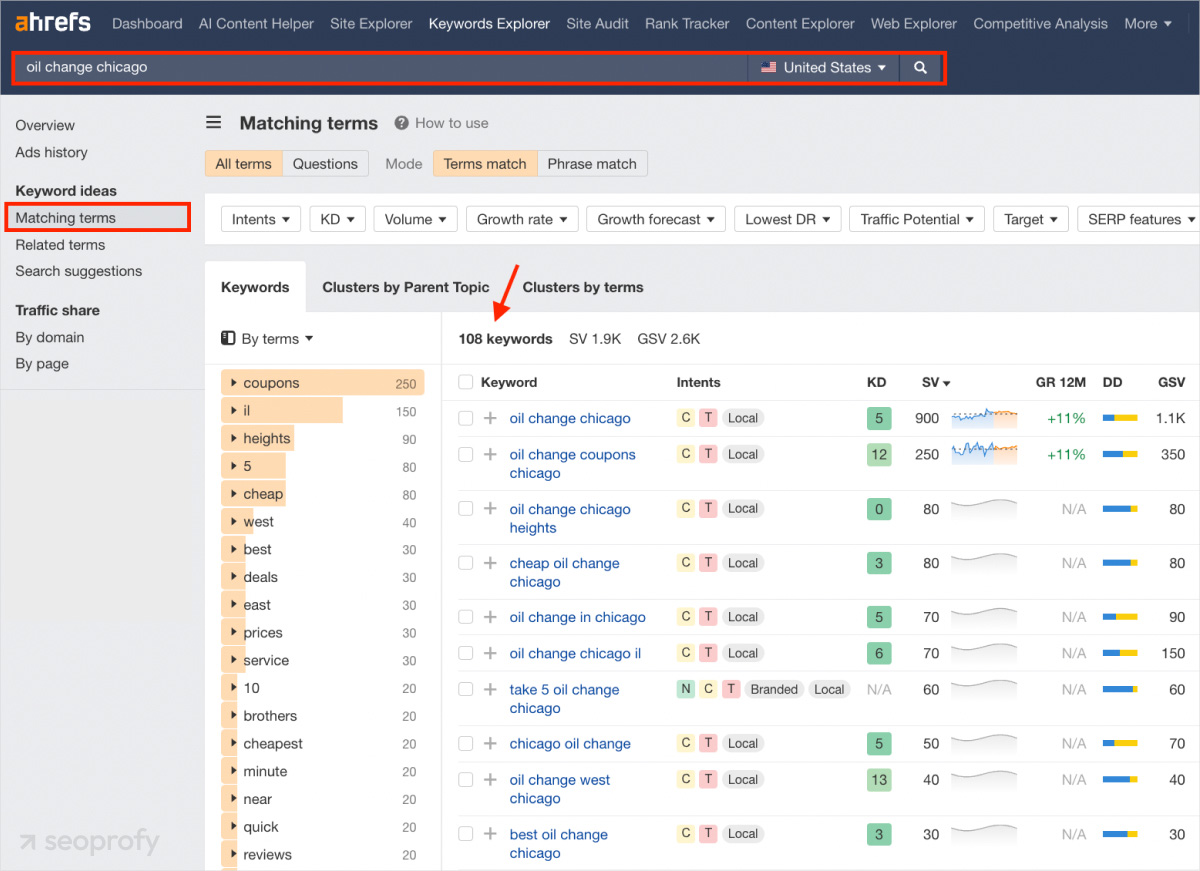
Here’s an example: we analyzed 10 keyword matches for “oil change” and found a geo-specific option with a lower KD.
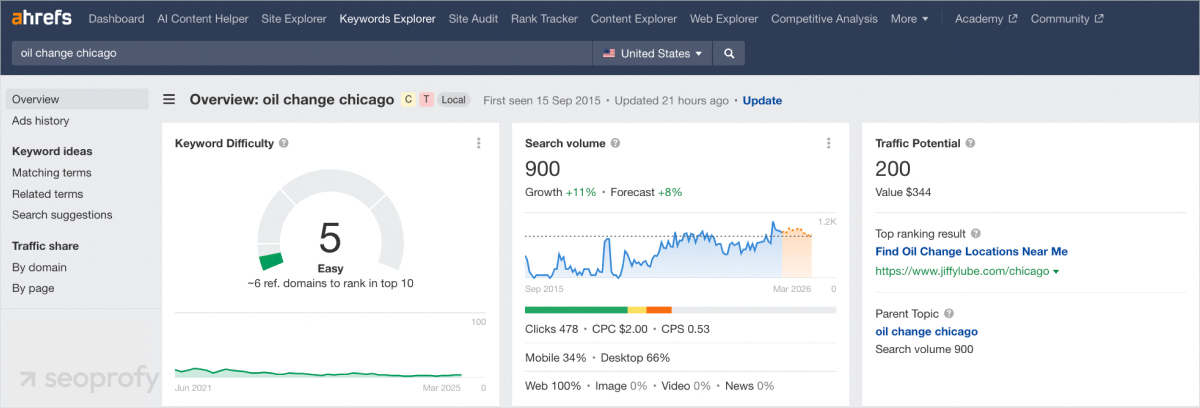
Checking competitors’ target keywords is also a part of SEO for franchises. Enter their site into Site Explorer and see which keywords are driving traffic.
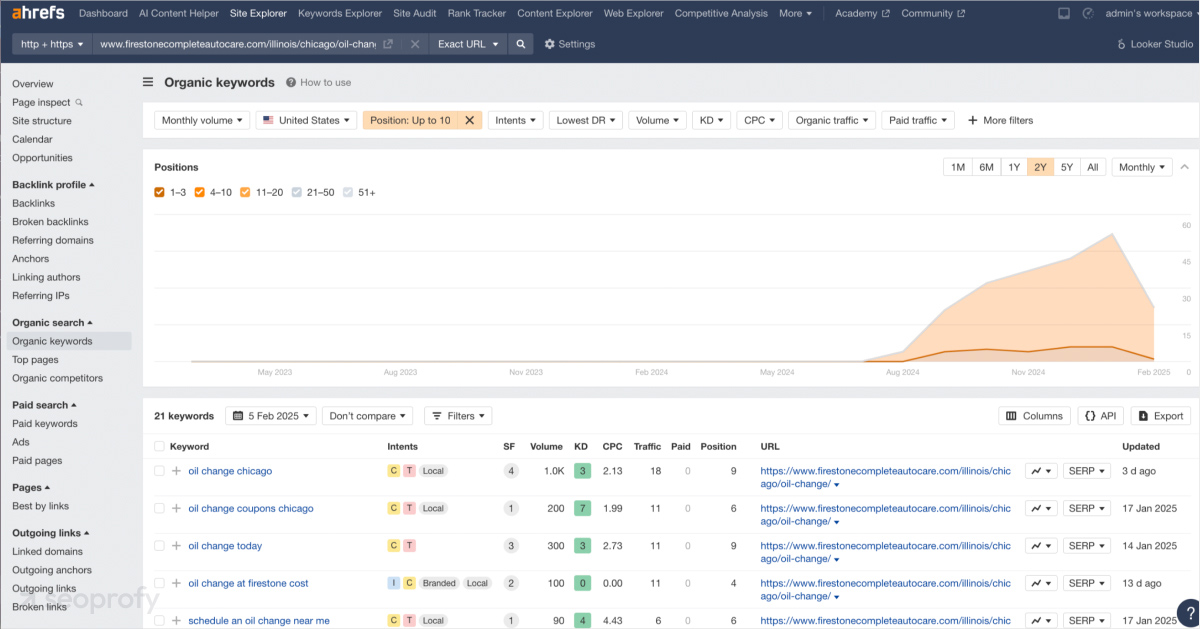
It might seem illogical to target broader terms for local franchise marketing when you can narrow the focus with geo-specific queries. But you can still target them, as search engines will show each user locally relevant results anyway. For a strong keyword strategy, group your terms and use a variety.
However, keywords are only effective for franchise SEO if used right. Include them in H1, titles, meta descriptions, website content, service descriptions, and FAQ sections.
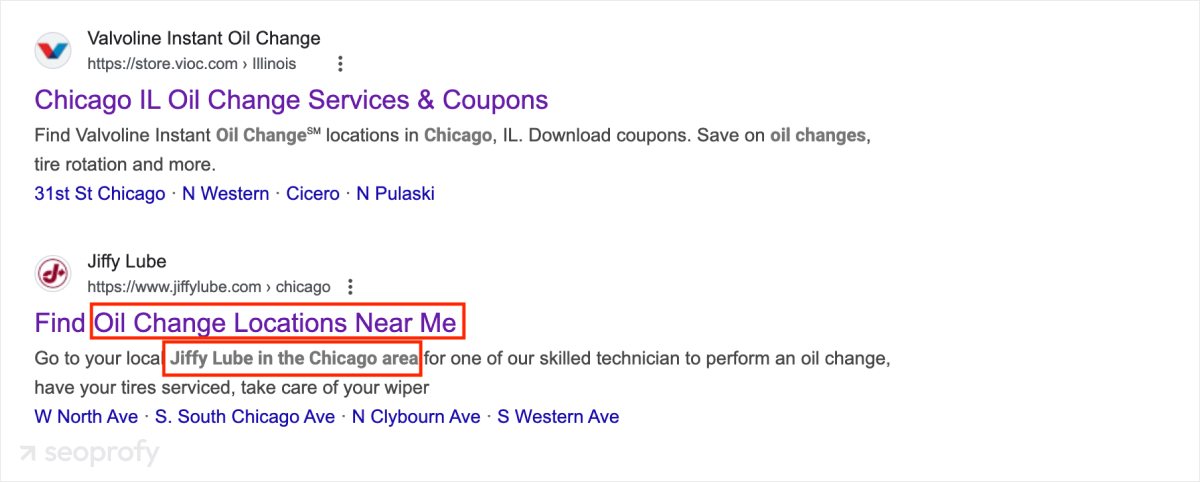
Check out how Jiffy Lube, in addition to off-page practices, uses keywords in the content of its local landing pages.
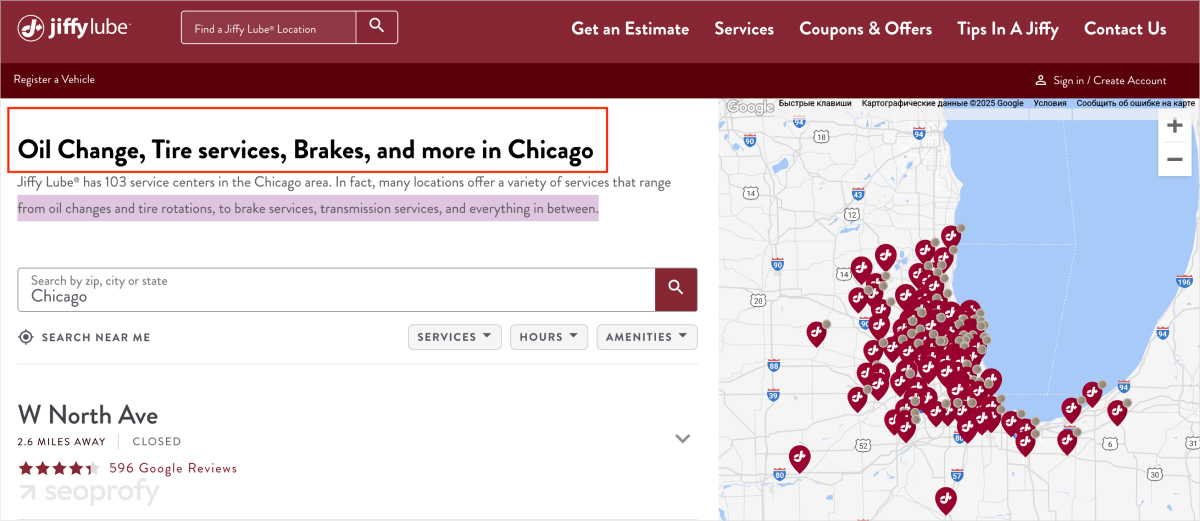
In the context of regional SEO for franchises, keyword research must be conducted separately for each location’s web page, which can feel overwhelming for everybody new to the process. However, working with a professional franchise SEO agency allows you to offload this complexity and be sure each location is optimized effectively.
Optimize Google Business Profiles
Google Business Profile (GBP) is your company’s listing in Google’s local search results and Google Maps. It used to be called Google My Business, but its goal remains the same — to help users find businesses quickly.
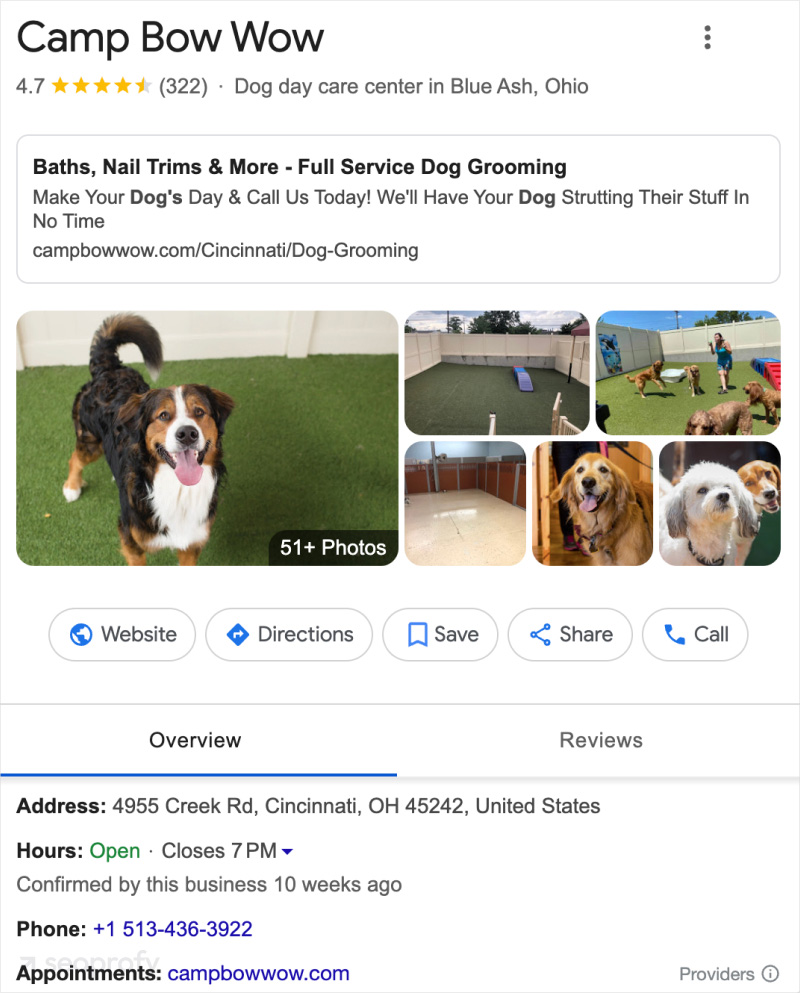
When your profile is complete, Google pulls its data to match your business with relevant local searches. You can create a profile on the GBP website. It’s free and takes just a few minutes. Verifying your location can take anywhere from a few hours to several weeks. Here’s what you should include in your GBP:
- Full name, address, phone number (NAP data)
- Business hours and categories
- A detailed description with keywords (but avoid keyword stuffing)
- Updated photos (profiles with photos get more clicks)
- Regular posts and responses to reviews
Tip: Google highlights “justifications.” These are snippets from your GBP that appear directly in organic search results (e.g., “This shop sells dog food”). If you include precise services in your GBP, there’s a good chance it will improve franchise online visibility.
Your franchise needs visibility—our local SEO strategies make it happen. Here’s what we focus on to drive results:
- Targeting the right local keywords
- Enhancing search visibility
- Building local engagement and more

Register Your Business in Local Listings
Getting listed in local directories is a must for successful SEO for franchises. Google may use these citations to verify business details and improve search relevance. Moreover, platforms like Yelp often outrank individual websites. So, being listed is a good chance to get more visibility.
Top U.S. local directory listings for franchises are Yelp, BBB, Bing Places, and Foursquare. Most offer free listings. Simply claim or create your profile.
To discover more listing opportunities, run a competitive analysis in Ahrefs:
- Not linking to: your page
- Linking to: your three top competitors web pages
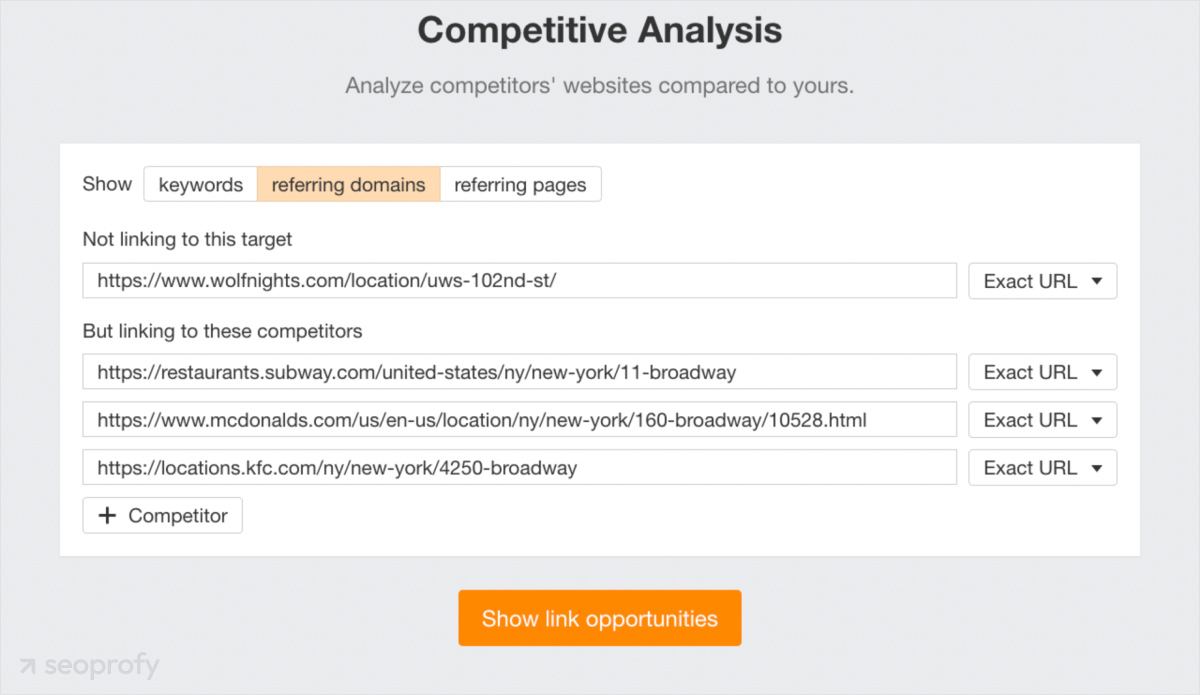
Examine their referring domains. Some of them will be business directories linking to them but not to you.
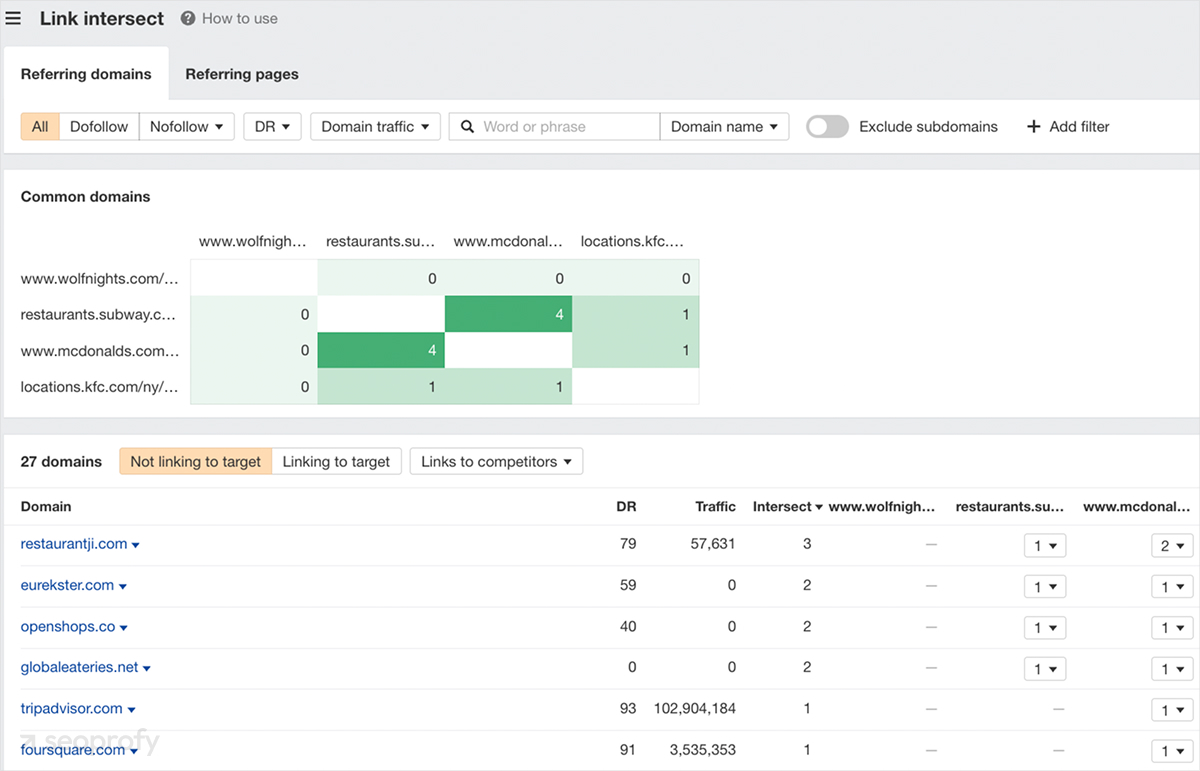
Ensure Accurate NAP Information
Inconsistent NAP confuses the search engine and may weaken local rankings. Every listing must be identical across all platforms. Heads up: even tiny differences (like “St.” vs. “Street”) can create duplicate listings that hurt your authority. Must-have details for local listings include:
- Business name (exact brand spelling)
- Physical address (no PO boxes)
- Local phone number (avoid call tracking unless dynamic)
- Website URL (consistent with GBP)
- Business hours (match across all listings)
So, NAP consistency for franchises requires special attention. Regular audits help catch duplicates.
Build Local Backlinks
Backlinks are links from other websites that point to your site. They act like recommendations. When a reputable local site links to your business, signal to Google that your franchise is trusted and authoritative in its location. The more high-quality local backlinks a franchise has, the better its chances of ranking higher in local search results.

Local SEO for franchises benefits from quality links that are geographically and contextually relevant. Here’s who can be a donor for your backlinks:
- Local directories & citations: Listings on Yelp, BBB, local chambers of commerce, and industry-specific directories.
- Regional news & media: City-based news sites, blogs, or local magazines.
- Local guest posts & partnerships: Writing for regional industry blogs or collaborating with complementary businesses (e.g., a car repair shop linking to a tire service).
Not all backlinks are equal. Links from forums, unmoderated directories, or bulk purchases on platforms like Fiverr and PeoplePerHour are often ignored or penalized by Google. These low-quality links provide zero SEO value and can hurt rankings instead of helping.
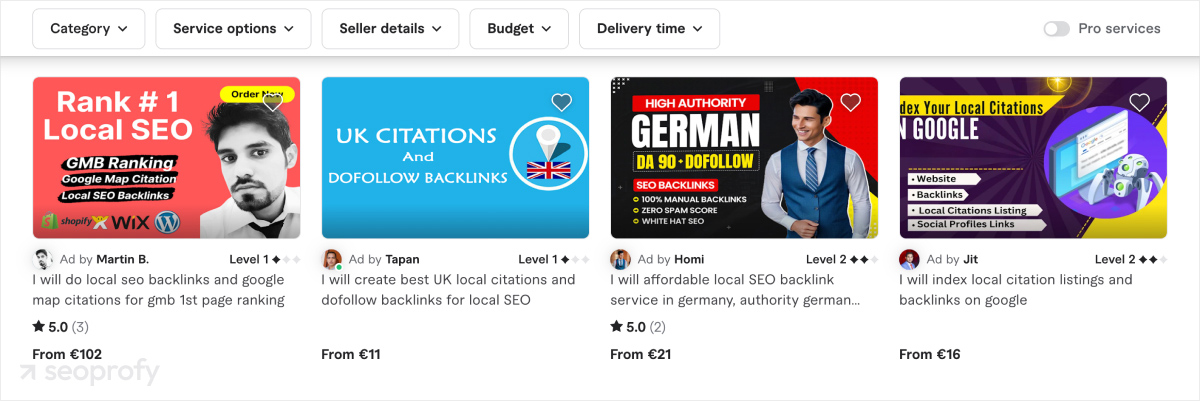
For many franchise owners, managing backlinks across multiple locations seems time-consuming and complex. That’s why 40% of small businesses outsource some or all of their local SEO work. Getting expert support from local SEO services helps them achieve strong results without spreading their team too thin.
Fix Technical Issues and Improve Website Speed
Technical SEO problems have a direct impact on local SEO for franchises, affecting everything from rankings to crawlability and user experience. Google prioritizes fast, well-optimized websites: slow load times, broken links, and poor Core Web Vitals can push even the best-optimized content down in search engine result pages.
Use Google PageSpeed Insights to diagnose problems. Ahrefs Site Audit will help detect deeper technical issues. Focus on Core Web Vitals. These are three key metrics Google checks:
- Largest Contentful Paint (LCP) measures how fast the main content loads. Aim for ≤2.5s.
- Interaction to Next Paint (INP) measures how responsive your site is to user interactions. Keep it ≤200ms.
- Cumulative Layout Shift (CLS) tracks unexpected layout shifts. Keep it ≤0.1.
Then, crawl errors and broken links. Googlebot struggles with inaccessible pages, which can cause indexation issues.
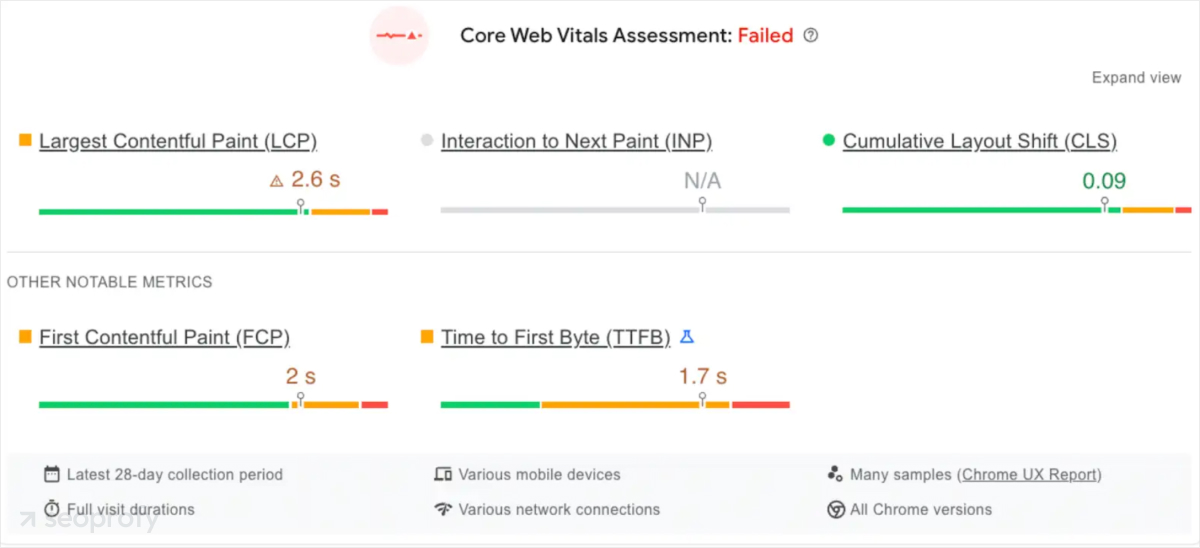
Also, run performance checks using Chrome DevTools (Performance Tab) to see how your site loads and find render-blocking issues. Work on optimizing images, using lazy loading, and eliminating unnecessary scripts. This will contribute to better franchise marketing SEO in general.
Technical SEO requires specialized knowledge, which is often found in teams providing local franchise SEO services. So, if optimization becomes too complex to handle in-house, outsourcing is always an option.
Implement Structured Data Markup
Structured data markup, specifically LocalBusiness schema, helps search engines interpret business details like NAP, operating hours, and services. Accurate structured data markup increases the chances of franchise locations showing up in local packs and knowledge panels.
Ultimately, this can have a measurable impact on SEO for franchises. Food Network, for example, converted 80% of its pages to support search features and saw a 35% increase in visits.
Use JSON-LD format (Google’s recommended method) and add LocalBusiness schema to your franchise location pages. Essential properties are:
- @type: LocalBusiness
- name: Exact business name
- address: Full location details (street, city, zip, country)
- telephone: Local contact number
- openingHours: Accurate business hours
Then, validate your schema using Google’s Rich Results Test/Schema.org Validator. This ensures your markup is correctly structured and recognized by search engines. Here’s how Schema.org validates the code snippet we created as an example:
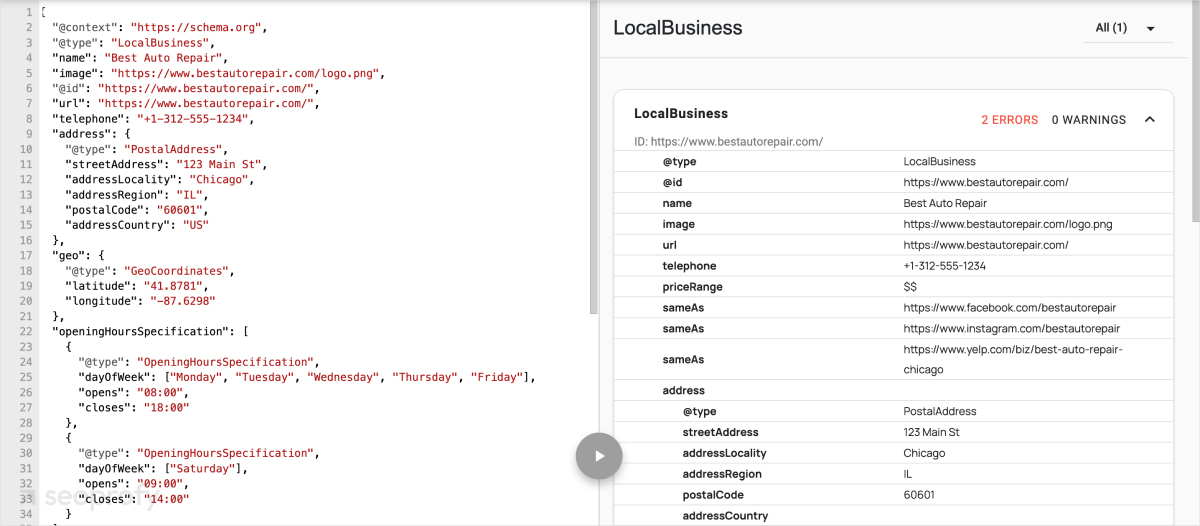
Encourage and Manage Customer Reviews
We’ve already covered how important Google reviews are for franchise SEO. The challenge for franchises is maintaining a consistent level of service across locations, and reviews help highlight weaknesses at individual branches.
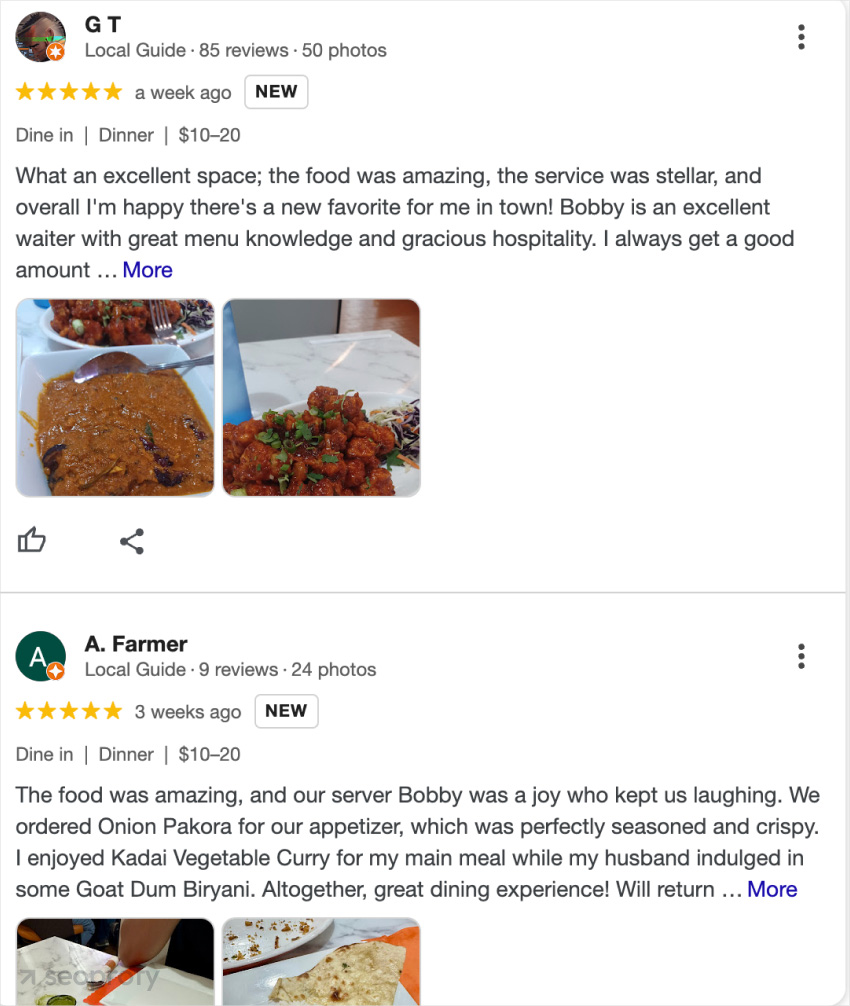
Sitting back and hoping local customers leave reviews isn’t a strategy. You have to encourage them. Loyalty programs, staff involvement, and QR codes that link directly to review pages all help. Just adhere to Google’s rules, which ban offering direct financial rewards for reviews.
Reviews are scattered across different locations, and each one affects the entire franchise. The corporate office can manage them through Google Business Profile Manager, but local staff should handle quick responses. Two key SEO tips for franchises to keep reviews in check are:
- Use a unified protocol (reminders at checkout, follow-up emails, QR codes — whatever gets online reviews flowing.
- Respond quickly to negative feedback (set up Google Alerts for notifications). You can’t delete the bad, but you can drown it out with fresh, positive reviews.
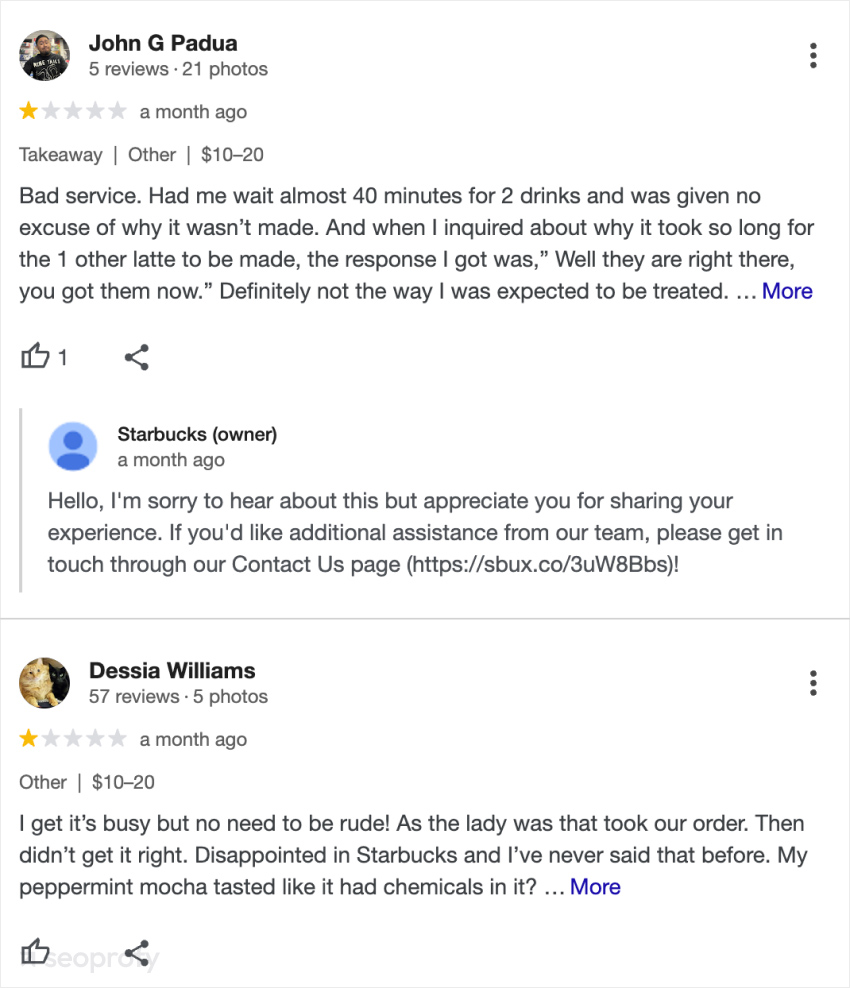
Handled right, reviews can improve local SEO for franchises, help locations get into the Local Pack, and generally strengthen the brand’s reputation. Track SEO results to understand how reviews impact visibility. While Google doesn’t give us a clear way to measure it, Ahrefs/local tracking can show some patterns. For example, a growth in reviews might explain why some locations appeared more frequently in the Local Pack.
Meet Google’s E-E-A-T Criteria
SEO for franchises includes following E-E-A-T principles (Experience, Expertise, Authoritativeness, Trustworthiness). It’s not a direct ranking factor for Google, but still part of its evaluation system. The search engine looks at how reliable the source of information is, especially in areas where trust matters most.
For franchises, this means each location needs to prove its expertise and trustworthiness. Let’s go through E-E-A-T and see how franchises can use it to get ahead in local SEO.
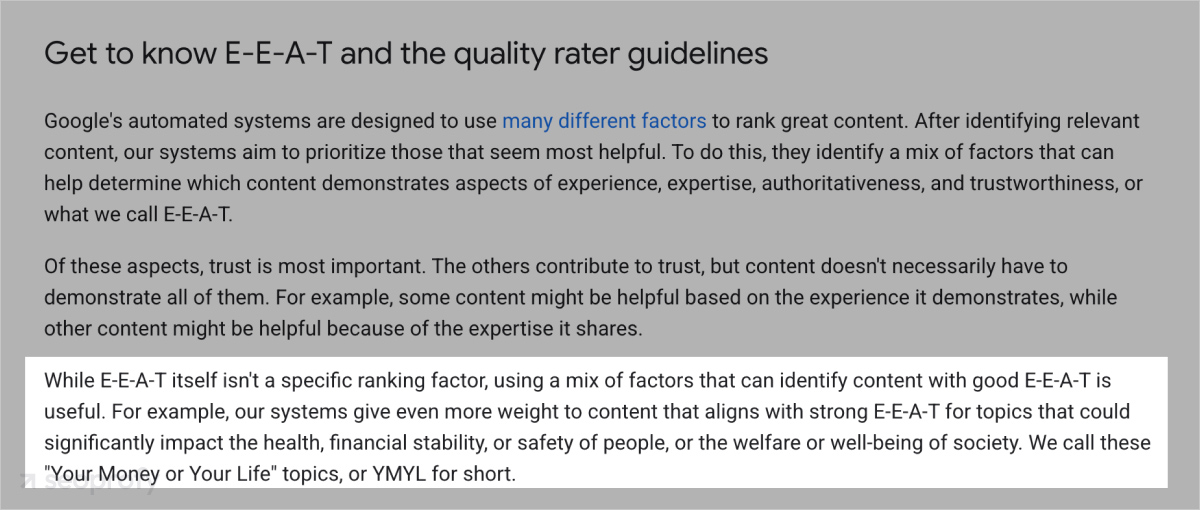
Experience is shown by real-world data: staff photos, client case studies, and how your business operates day-to-day. For a network of dental clinics, for example, content about treatments should come from actual doctors, not just copywriters.
Expertise is seen through authorship. Ideally, your “About Us” page should feature real bios of key staff members across the franchise. Authoritativeness comes from mentions in local media, partner links, and ratings on authoritative platforms. For example, if an auto repair chain gets recommendations from local car experts or associations, it can improve the brand’s perception with search engine algorithms.
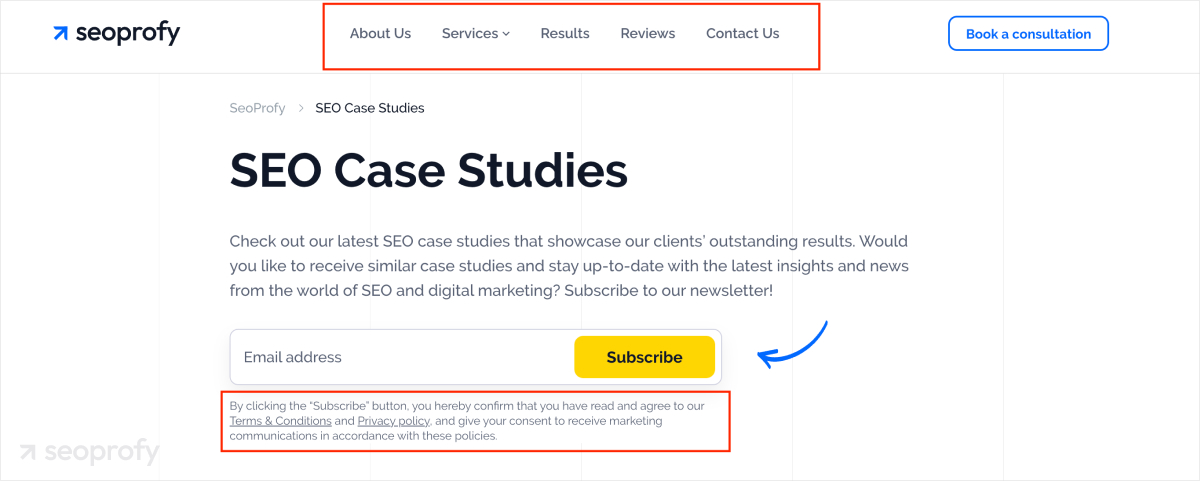
Trustworthiness is simple: transparency. Complete NAP info, up-to-date contact details, full location data, return policies, certifications, and customer reviews should all be available. Google prioritizes website security, so HTTPS, clear privacy policies, and secure payment processing are also necessary for building trust.
When dealing with local SEO for franchises, each location in your must meet these criteria. Google evaluates E-E-A-T for each page, so consistency across locations counts.
Mistakes to Avoid in Franchise SEO Strategy
Franchises often face SEO challenges that aren’t apparent right away but end up hurting rankings and traffic. While an independent business can quickly adjust its strategy, a franchise risks scaling the problem across dozens or even hundreds of locations. Here’s a look at the common missteps to watch out for.
Duplicate Content Across Locations
Duplicate content is one of the most common issues in SEO for franchises. It may impact local rankings. When dozens of locations use the same copy on their pages, Google struggles to decide which version to rank. So, it either ignores them or picks “the best” one. As a result, individual locations miss out on visibility, and traffic is lost.

A common mistake is using templated descriptions with only the city swapped out. For example, “Our auto repair shop in New York offers oil changes,” followed by the same text for Chicago, Los Angeles, and other cities. For search engines, these pages look almost identical. Each location needs unique content customized to the region, local services, reviews, and even the target audience.
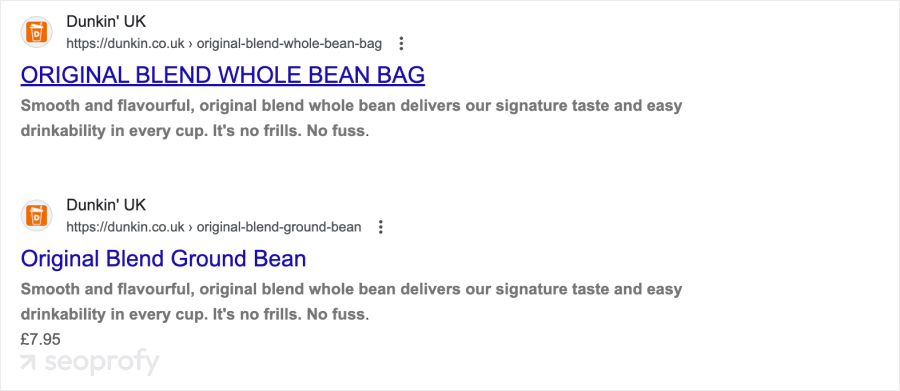
Another risk is technical duplication. If franchise pages are structured as /locations/phoenix and /phoenix but lead to the same content, Google might see this as duplication. To avoid issues, set up canonical URLs correctly and maintain a clear site structure.
It’s worth noting that you shouldn’t expect a direct penalty for having duplication. However, duplicate content weakens franchise SEO generally, reduces the relevance of local landing pages, and makes it harder to compete with independent businesses.
Ignoring Mobile Optimization
Franchises focused on local traffic can’t afford mistakes with mobile optimization. More than 80% of local searches happen on smartphones. Since Google uses mobile-first indexing, a site that’s not mobile-friendly loses rankings and conversions.
The problem is that some franchises still use outdated templates or sites that aren’t adapted for mobile. If a page takes longer than three seconds to load, over 50% of users will leave. This is especially critical for location pages: slow loading times, unreadable buttons, or broken maps can cost you customers right before their possible visit.
Another issue is poorly adapted content. If local information is hidden in dropdowns, search engines may see it as less important, which can hurt your search rankings. Bad image scaling, unclickable phone numbers, or broken “Get Directions” buttons make the user experience difficult.
To avoid losing mobile traffic, franchises should check Core Web Vitals through Google PageSpeed Insights, just like they would for desktop pages. For a more detailed audit, Lighthouse in Chrome DevTools is a good option.
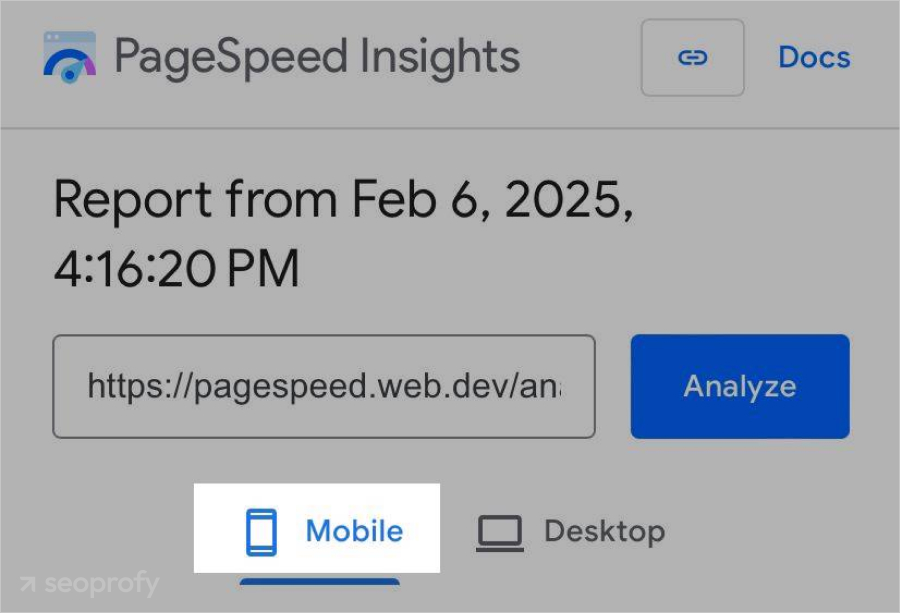
Anyone working on SEO for franchise businesses shouldn’t treat mobile optimization as just a design issue. It’s actually a factor in retaining customers.
Inconsistent Branding Across Pages
In SEO for franchise, a unified brand impacts trust and how the business is perceived. If different locations use varying logos, styles, descriptions, or even tone in reviews, it dilutes the brand and hurts recognition.
A common mistake is inconsistency across Google Business Profile, location websites, and social media. For example, if one location lists itself as “Lucia Pizza” in GBP and as “Lucia Pizza & Grill” on their website or social media pages, search engines might treat them as separate businesses, which affects SEO for franchise.
Branding needs to be consistent across all touchpoints, from the name and logo to descriptions and visual elements. This alignment builds trust, simplifies local SEO for a franchise, and makes the brand more recognizable to both Google and customers.
Expecting Immediate Outcomes
Businesses often expect quick results from local SEO for franchises. However, in reality, search engine optimization takes time and consistency. If a location is newly launched, competing with well-established local businesses becomes tougher.
For people starting with SEO for franchise websites, a major misstep is making multiple changes, not giving them time to take effect, and then shifting strategies too soon. For example, if a new location is added to the Google Business Profile but hasn’t yet appeared in the Local Pack, it doesn’t mean the local SEO strategy for franchises isn’t working. Google can take weeks to process changes.
So, even a well-executed franchise SEO campaign won’t deliver instant results. Optimized pages, collected reviews, local backlinks, and accurate NAP data build a reputation with search engines over time.
End Statement
For franchise websites, local search is a bigger challenge than for independent businesses. Even if the brand is recognized, a disjointed SEO approach can leave some locations ranking well and others buried in the results. Multi-location SEO for franchises solves this by aligning all locations under a unified strategy. A clear strategy around content, reviews, and local backlinks help maintain search ranking stability without depending on paid search.












